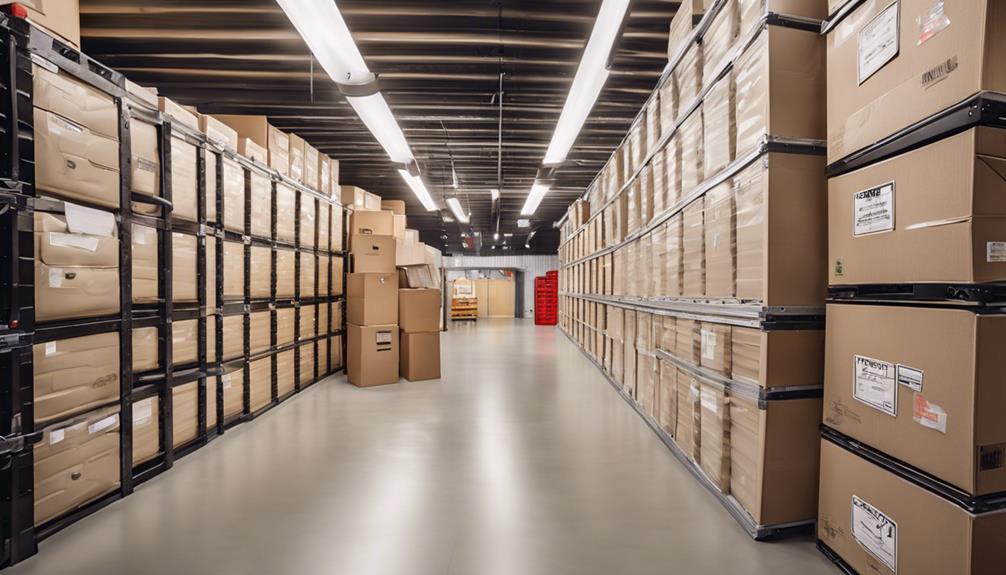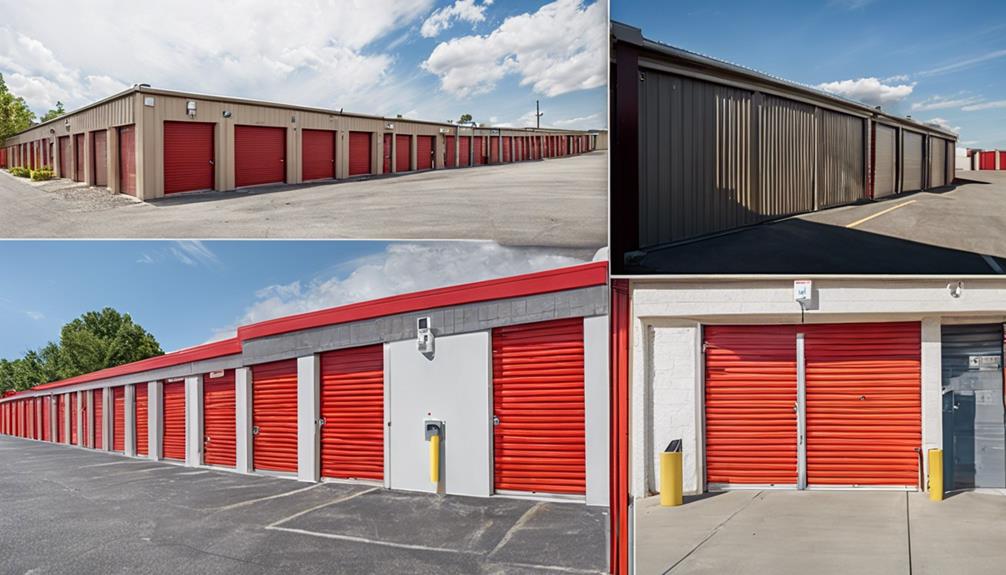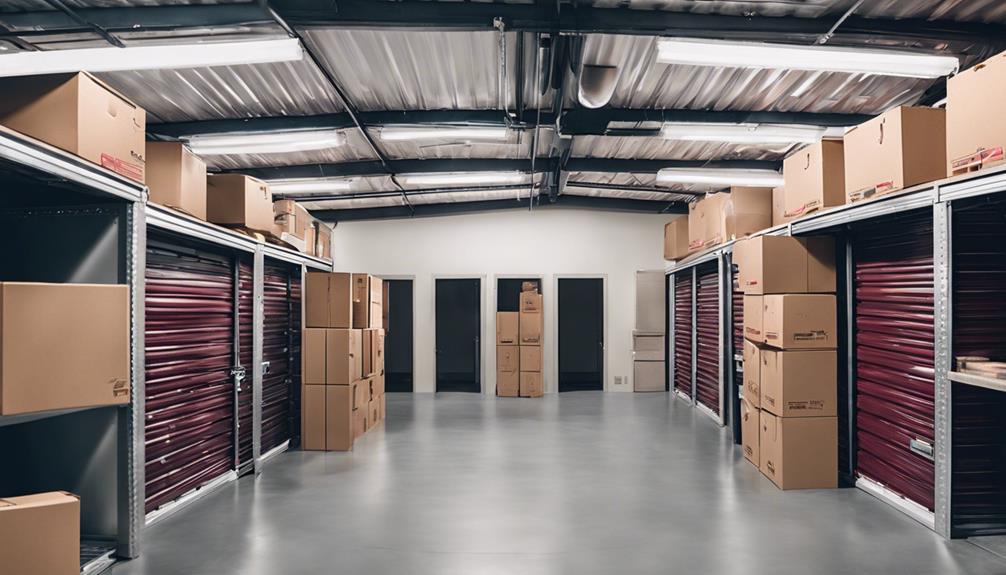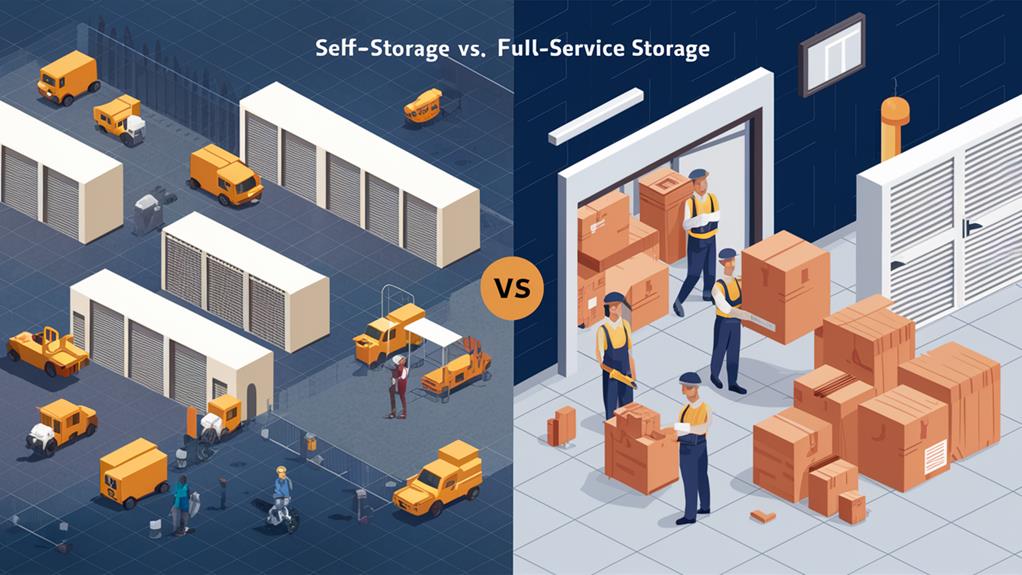When choosing between self-storage and full-service storage, it's essential to consider your needs. Self-storage gives you 24/7 access to your items, letting you organize them as you like. It's often cheaper, with monthly rates ranging from $29 to $100. However, you handle all the moving and transport yourself. In contrast, full-service storage offers convenience, as they pick up, store, and deliver your items, but it generally costs more and limits your access to scheduled times. Each option has pros and cons, so think about your accessibility, budget, and how much help you need with your belongings. Additional insights await.
Overview of Self-Storage

When it comes to storage solutions, self-storage units offer a flexible and customizable option for individuals and businesses alike. These units come in various sizes, ranging from 5 x 5 to 12 x 30 feet, allowing you to choose a space that fits your specific storage needs.
If you need frequent access, drive-up access units make loading and unloading from your vehicle quick and easy. Additionally, many self-storage facilities provide advanced security measures to safeguard your belongings, giving you peace of mind during your transition.
Many self-storage facilities offer month-to-month rental agreements, so you won't have to commit to long-term contracts. This flexibility is great for those who may need storage for a short period.
However, keep in mind that storage costs can vary. Typical prices for small self-storage units range from $29 to $89, with additional fees for locks, insurance, and administrative costs.
Security features are also important to consider; some facilities provide enhanced safety options like surveillance cameras and key code access, ensuring the security of your belongings.
Understanding Full-Service Storage
Self-storage units provide a hands-on approach to storage, but full-service storage takes convenience to another level. With full-service storage facilities, you don't have to worry about transporting your items. Instead, companies pick up, store, and deliver your belongings as needed, letting you focus on other responsibilities.
Many providers offer inventory management, where they photograph and log your items, making organization for renters easy and efficient. Additionally, many full-service storage options include climate-controlled environments, which are essential for protecting sensitive items from extreme temperatures and humidity.
While the convenience is appealing, be aware of the high costs associated with full-service storage. The price often includes transportation, packing assistance, and labor, making it more expensive than traditional self-storage options. Some facilities even offer climate-controlled storage, which is essential for protecting sensitive items from extreme temperatures.
However, keep in mind that access to belongings in full-service storage is typically limited outside of business hours. You'll need to schedule appointments to retrieve your items, which may not suit everyone's needs.
If you value convenience and are willing to invest in a hassle-free experience, full-service storage might be the right choice for you.
Key Differences in Access

Access to your belongings can significantly impact your storage experience, and understanding the key differences between self-storage and full-service storage is crucial. When you consider your options, think about how often you'll need to retrieve items and how much control you want over your storage.
- Self-storage facilities typically offer 24/7 access, letting you retrieve items whenever you want.
- In full-service storage, you'll need to schedule appointments, which often restricts access to business hours.
- With self-storage, you have complete control over organizing and managing your items, while full-service storage relies on a professional team to handle everything.
- Some self-storage units provide drive-up access for easy loading and unloading, making it convenient for you.
- Full-service storage may include online inventories for item management, but you might still wait for staff assistance to retrieve your belongings.
Cost Comparisons
Choosing between self-storage and full-service storage often comes down to cost. Self-storage typically ranges from $29 to $100 per month, depending on the size and location of your unit, while moving costs can add up if you need to transport items frequently.
In contrast, full-service storage can be significantly more expensive due to the added logistics and services it offers. In major cities like San Francisco and Boston, full-service options can exceed self-storage costs by 50% or more.
While self-storage can be more budget-friendly, you need to factor in additional costs such as lock fees, insurance, and administrative fees, which can range from $25 to $50.
Full-service storage usually includes these costs in its overall pricing, but it often charges a premium for convenience. This convenience includes pickup and delivery services, which you might find appealing if you don't want to manage your own transportation.
Ultimately, you have to weigh the benefits of affordability against the convenience of full-service options. If your budget is tight, self-storage might be a smart choice. However, if you value ease and assistance, the higher costs of full-service storage could be worth it for you.
Security Features

When considering your storage options, security features play a vital role in protecting your belongings. You want to ensure that your items are safe and secure, whether you choose self-storage facilities or Full Service Storage.
Self-storage units often rely on customer-provided locks, which can be vulnerable to tampering. On the other hand, Full Service Storage facilities usually have trained staff monitoring the premises, offering enhanced security.
Here are some key security features to consider:
- Surveillance cameras to monitor activity around the clock
- Locked access during non-business hours to limit unauthorized entry
- Gated access that requires a passcode for entry
- Insurance coverage options to protect against theft or damage
- Regular security checks by staff to ensure everything is secure
While many self-storage facilities implement various security measures, the level of protection can differ significantly by location.
Full-service storage often includes insurance as part of the package, ensuring your items are covered.
Ultimately, when choosing between these options, think carefully about the security features that matter most to you and your belongings.
Pros and Cons
Both self-storage and full-service storage come with their own set of advantages and disadvantages.
With self-storage units, you typically experience lower costs and greater accessibility. You can access your belongings whenever the facility is open, often with options for 24-hour access. However, it requires manual labor and personal transportation, which can be a drawback if you lack the necessary resources or mobility.
On the other hand, full-service storage provides significant convenience. Companies manage packing, pickup, and delivery, making it ideal for those with limited time. But remember, this convenience comes at a higher price point. Full-service storage often includes features like inventory management and climate control, enhancing the safety and organization of your items. However, these features may involve additional fees.
Additionally, self-storage facilities usually offer flexibility in rental agreements, allowing month-to-month rentals. In contrast, full-service storage often has more rigid minimum terms, typically requiring contracts of 3-5 months.
Making the Right Choice

When choosing between self-storage and full-service storage, you need to consider factors like cost, accessibility, and convenience.
Self-storage might save you money but requires more effort, while full-service options offer ease at a higher price.
Think about how often you'll need access to your items and whether you prefer to handle everything yourself or have professionals help you out.
Cost Comparison
Choosing between self-storage and full-service storage comes down to understanding the costs involved. Self-storage typically ranges from $29 to $100 per month for smaller units, while full-service storage often exceeds $100 due to additional services. These services can include pickup and delivery, which might incur extra fees based on the size and number of items.
Here are some key cost considerations to keep in mind:
- Monthly Rates: Self-storage is often cheaper than full-service options.
- Additional Costs: Look out for lock fees, insurance coverage, and administrative fees, usually ranging from $25 to $50.
- Contract Length: Self-storage often offers month-to-month rentals, while full-service providers may require 3-5 month contracts.
- Major Cities: Storage rental prices are higher in major cities, such as San Francisco and Boston.
- Temperature Controlled: If you need climate-sensitive storage, be prepared for higher costs in both options.
Understanding these factors will help you make an informed choice based on your budget and needs.
Whether you choose self-storage or full-service storage, knowing what to expect financially is essential for a smooth experience.
Accessibility Considerations
Considering accessibility is crucial when deciding between self-storage and full-service storage. Self-storage facilities typically offer 24/7 access, allowing you to retrieve or store your items whenever it suits you. This level of convenience gives you complete control over your belongings, making it easy to access them without needing to schedule appointments.
On the other hand, full-service storage often requires you to coordinate with staff for retrieval, which can limit your access outside of business hours. If you need frequent access to your items, this can be inconvenient. Additionally, while some self-storage locations provide extended hours, full-service options may have stricter schedules due to staffing, further restricting your accessibility.
When choosing between these options, consider how often you'll need to access your items. If quick and easy retrieval is a priority, self-storage may be the best choice. However, if you prefer a hands-off approach and don't mind scheduling, full-service storage could work for you.
Ultimately, understanding your needs regarding accessibility will help you make the right choice for your storage requirements.
Convenience Factors
Convenience plays a pivotal role in your decision between self-storage and full-service storage. When you weigh the options, consider how each type meets your needs for ease and accessibility.
Self-storage facilities offer 24/7 access to units, letting you control your belongings whenever you want. On the other hand, full-service storage provides on-demand pickups and packing assistance, which can be a lifesaver if you're short on time or have mobility issues.
Here are some convenience factors to keep in mind:
- Access to units: Self-storage allows you to visit anytime; full-service needs scheduling.
- Packed supplies: Full-service often includes packing help, saving you effort.
- Climate-controlled environments: Full-service protects sensitive items, while self-storage may not.
- Month-to-month rentals: Self-storage offers flexibility; full-service might lock you into longer contracts.
- Inventory management: Full-service helps track your items, making organization easier.
Ultimately, think about what matters most to you: immediate access or professional assistance.
Balancing convenience and cost will help you make the right choice for your storage needs.
Conclusion
In conclusion, choosing between self-storage and full-service storage depends on your needs. If you prefer easy access and want to manage your items yourself, self-storage might be the way to go. However, if you want convenience and don't mind paying a bit more, full-service storage could suit you better. Consider your budget, how often you'll need to access your belongings, and the level of security you want. Making the right choice can help you organize your space effectively.
